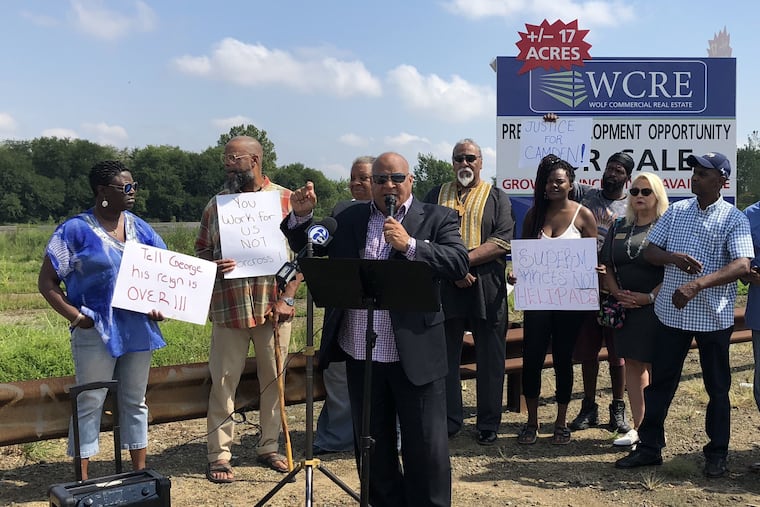Camden residents call out ‘food desert’ status, after fresh round of tax-break controversy
Questions over the city's lack of a supermarket have centered on a controversial law that was allegedly crafted to favor special interests.

Connie Kellum is such a loyal ShopRite customer that she wins a free turkey or ham every year. But since there is no supermarket for the 75,000 residents in her hometown of Camden, the 55-year-old foster mother treks to Cherry Hill and other towns, instead.
At a news conference on Thursday, she joined a group of city residents and community activists in calling attention to Camden’s “food desert” status, amid an ongoing controversy over 2013 tax credit legislation that was allegedly crafted to favor special interests.
A recent Politico report highlighted aspects of the law that seemed tailored to favor a grocery store proposal by a client of a powerful law firm, Parker McCay, which also drafted portions of the legislation. Ultimately, neither that proposal nor a competing plan resulted in a supermarket for the city.
“I can’t believe we are standing here, asking for a food market,” said Kellum, who often ends up driving other people to the store, too. "Treat the city like there are human beings living here, and not animals.”
The Rev. Tim Merrill, who lives in East Camden, said he’s fortunate to have a car, but he has neighbors who “rely heavily” on corner stores, and don’t have access to the nutritional selection of a supermarket.
“Development is good, but when I can’t buy lettuce or an avocado without taking my money to Cherry Hill or Voorhees, it’s not right,” Merrill said.
Sandra Wiles, 48, said she uses a combination of buses and taxis to get to the grocery store, and then lugs her groceries home, with grandchildren in tow. “We need something here, for us," she said. “We’re not asking for anything different than what the other neighborhoods have,” she said.
The Politico article touched off a fresh round of disputes in Trenton, where Democrats have been battling each other over an investigation into the tax credit program. A spokesperson for Senate President Steve Sweeney issued a statement this week claiming that the law did not favor one proposal over another, and that both plans failed because of “market forces.”
Since the Economic Opportunity Act was signed into law by then-Gov. Chris Christie in 2013, New Jersey has approved about $1.6 billion worth of tax credits for businesses pledging to invest in Camden.
Organizers at Thursday’s event called on Democratic Gov. Phil Murphy to veto an extension of the law, which expired June 30.
They also said a round-table discussion with members of Murphy’s administration is in the works. A goal of that meeting would be to discuss how to bring a supermarket to Camden, said Amir Khan, with the Camden We Choose coalition.
A special task force, appointed by Murphy, has raised questions about tax credit applications submitted by firms with ties to Democratic power broker and businessman George E. Norcross III, who recently moved his insurance brokerage headquarters to an office tower on the Camden waterfront. That project won approval for $245 million in tax breaks.
Norcross, along with several companies and the law firm Parker McCay — led by Norcross’ brother Philip — sued Murphy over the creation of the task force, and they have denied any wrongdoing. The companies filed a notice of appeal last week, after a Superior Court judge tossed out the case.
Norcross has championed the tax credit legislation, and the business investment in Camden that followed, as a means of lifting up the long-impoverished city. Companies including the Philadelphia 76ers, Subaru, American Water, and Holtec International built new facilities there after winning multimillion-dollar tax breaks.
But community organizers and progressive Democratic activists have countered that the investments and tax breaks, largely concentrated in waterfront development, fell short of boosting other neighborhoods and supporting small businesses.
“The elephant in the room, especially as a resident, is the feeling we have that this is not for us,” Merrill said.